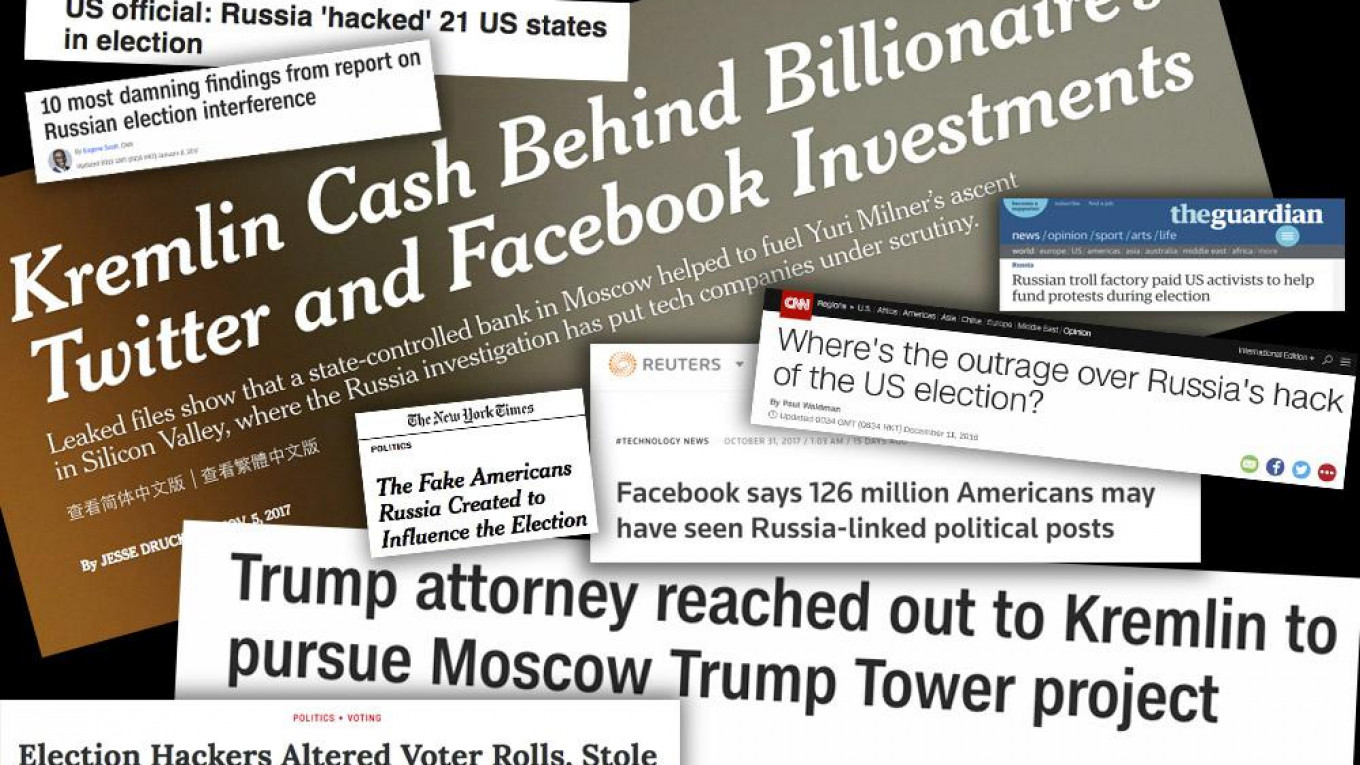The Western press has discovered that structures close to the Kremlin bought shares in Facebook and Twitter — obviously with far-reaching political designs.
I might be wrong, but it seems that this news would have caused a sensation here only five years ago. At the very least, Russians would have given it serious discussion in the same way they debated Alexander Mamut’s purchase of LiveJournal at that time.
This is especially true now, years later, because the political upshot of that deal is the indisputable loss of free expression that LiveJournal has suffered under Mamut’s ownership, as well as its descent into just one more unremarkable part of his unfailingly Kremlin-loyal media empire.
When Mamut bought LiveJournal, only the most outspoken members of the opposition raised the alarm that the Kremlin was buying up the blogosphere. But it is clear now that they were right, and we would be learning a lesson from that now if only the Western press had accused the Kremlin of buying up Russia’s social networks five years ago.
Five years ago, Russians would have at least taken it seriously. Now, that’s impossible.
This is not just because it is impossible to link Yuri Milner — the Russian billionaire with investments in Facebook, Twitter and other leading Internet resources — to those “structures close to the Kremlin.”
Milner has lived and worked in the public eye for many years, and even the most radical conspiracy theorists or the most skilled anti-corruption whistleblowers have not been able to link his name to those who really do channel senior officials’ ill-gotten gains through their private accounts.
Neither is it because credit at the state-owned Russian bank VTB and the root word “Gazprom” in Alisher Usmanov’s company name Gazprominvestholding in and of themselves cannot serve as proof of anything political.
Nor is it about the knowledge that the Kremlin of 2009 and 2011 – when Milner bought his tech shares — was the Kremlin of then-President and now Prime Minister Dmitry Medvedev. Medvedev was dedicated to a “reset” in relations with the U.S. and all manner of trendy youth-related pursuits, including electronic gadgets, social networks and the like.
That Kremlin did not influence Twitter and Facebook. Rather, Twitter and Facebook influenced the youthful Russian president, who, at the mention of social networks, was less a Dr. Evil and more an exuberant teenager.
And it’s not about how Russian businessmen investing in Western companies, at least since Roman Abramovich bought the Chelsea Football Club, were seen in Russia not as a part of Kremlin expansionism, but just the opposite – as seeking a way to protect their money from the Kremlin’s prying fingers.
In fact, almost every senior Russian official, including Vladimir Putin, complained throughout the 2000s about Russia’s irresponsible rich who refused to invest their wealth in Russia.
All this is important, of course, but it pales in comparison with the main reason why the current accusations against Milner are so absurd.
Unfortunately, it is difficult to find the right words to describe this problem without sounding like RT’s Margarita Simonyan and others of her ilk who have long complained — as part of the government’s propaganda and counter-propaganda efforts — that Western mainstream media are all wrong about Russia.
The main problem with accusations against Milner lies with his accusers.
The individuals and media outlets who claim the Kremlin is behind Milner’s actions are the same ones that have already shown, very convincingly, that they write nothing but nonsense about Russia.
The image of Russia that Western, and especially U.S. media, have concocted over the past 18 months is so distorted as to shock even the most vehement anti-Putin Russian reader.
Individually, such stories might not have produced such an impression. But they now flood us in a wave of accusations — about the Moscow region “power broker” and lawyer Natalia Veselnitskaya acting as a Putin agent, the hole in the wall through which urine samples were passed in the anti-doping scandal revealed by Dr. Rodchenkov, the singer Emin Agalarov acting on the Kremlin’s behalf, and the Russian ads — trivial in their volume compared to the volume of information on social networks — that allegedly influenced U.S. voters, and much more.
Against that backdrop, the suggestion that Milner is working for the Kremlin automatically sounds like a joke warranting no response except for a laugh of derision.
Or more precisely, tears of despair. Because, for conscientious Russians, what is happening in this country is a serious tragedy that has nothing to do with Milner or other Russian villains pilloried by Western investigative journalism, much less with the domestic U.S. political struggle that is, strictly speaking, none of our business anyway.
It drives home the fact that, compared to the U.S., Russia is a small, young, and backward country. Russia’s post-Soviet political culture is not even 30 years old, and years of authoritarianism have steamrolled what little there is of it flat into the ground. Someday someone will have to build it all anew.
The same is true of Russia’s media culture. Rising from the ruins of Soviet propaganda, it has fallen victim to so many external influences and internal mutations that its current condition defies positive description.
Russian media is now going through something even worse than a crisis, and someday someone will have to turn that around too. Russia is in no position to scold the U.S. for what is happening there. The situation here is no better.
You didn’t even have to watch CNN or read The New York Times to see these outlets as the standard for journalistic professionalism, integrity, and influence.
Every time state-controlled television or government propaganda hit a new low, it was reassuring to know that the Western media giants would never allow themselves to sink to such depths.
The belief in an almost heavenly CNN kept post-Soviet Russian journalists going. It gave them a goal toward which they could strive, or at least served as a key marker in their professional coordinate system.
The notion that the employees of Russia’s propagandistic media outlets are burnt-out cynics who have betrayed their values for the sake of monthly mortgage payments is naive. Anyone who has spoken to such people knows that they suffer from a different type of cynicism – namely, the belief that it is the same everywhere. We serve Russia, the CNN serves U.S. interests and the BBC is fully state-owned.
Of course, those working for Russia’s independent media always laughed at such an assertion. They are not laughing anymore.
In the past 18 months it has been the Western press that, with its high standards, has given us too many of their own versions of Russian state TV’s ludicrous report that Ukrainian nationalists had crucified a Russian boy for readers to ignore.
And, whereas no one believed that nonsense about the crucifixion, the Russian conspiracy theories now bandied about by the Western media are made all the more terrible by the fact that you might know it is nonsense, but that that knowledge means nothing in light of the reputation of these newspapers and channels. And that these media outlets couldn't care less if a handful of Russian viewers and readers no longer believed them.
It's true that Russian media are too small, provincial, and backward to have any moral or other right to criticize their giant Western counterparts. But the picture-perfect view they once held of the Western universe has been shattered, and rather than try to put the fallen pieces back into place, it is time they realized that the image was only a chimera to begin with, and hell knows what really fills the skies overhead.
This all sounds as if the U.S. no longer has any paragons of virtue left to idolize. Well, if it hasn’t, that in itself is important news for people this side of the ocean.
At some point, quantity becomes quality, and the Western press has already published so many inaccurate, exaggerated, and knowingly untrue things about this country that the only Russians who seriously consider Milner a Kremlin agent are either terribly naive or cynically hypocritical.
These labels once applied first and foremost to the gullible viewers of state-controlled Russian television: Now they apply equally to those seeking truth about Russia in the Western press.
It is probably too early to call this a tectonic shift, but it is worth noting as a potentially important factor: The crisis of trust in the Western media that we “poor Russian provincials” are experiencing will inevitably affect the public mood in this country.
Oleg Kashin is an opposition-leaning Russian journalist, formerly of Kommersant, who writes a weekly column at Republic.ru, where a Russian-language version of this op-ed was first published. The views and opinions expressed in opinion pieces do not necessarily reflect the position of The Moscow Times.
A Message from The Moscow Times:
Dear readers,
We are facing unprecedented challenges. Russia's Prosecutor General's Office has designated The Moscow Times as an "undesirable" organization, criminalizing our work and putting our staff at risk of prosecution. This follows our earlier unjust labeling as a "foreign agent."
These actions are direct attempts to silence independent journalism in Russia. The authorities claim our work "discredits the decisions of the Russian leadership." We see things differently: we strive to provide accurate, unbiased reporting on Russia.
We, the journalists of The Moscow Times, refuse to be silenced. But to continue our work, we need your help.
Your support, no matter how small, makes a world of difference. If you can, please support us monthly starting from just $2. It's quick to set up, and every contribution makes a significant impact.
By supporting The Moscow Times, you're defending open, independent journalism in the face of repression. Thank you for standing with us.
Remind me later.








